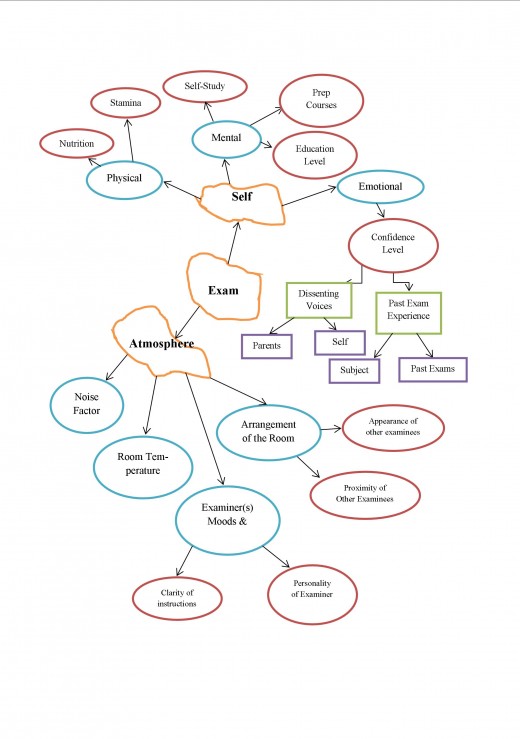Tips on How to Score Well on Tests and Exams - Factors Related to Test Taking

This hub discusses factors related to important tests and exams. Important tests and exams such as the SAT, GED, or Advanced Placement can be very frightening. Even good students have been known to freeze up in the face of standardized exams and other important tests. One way a student or other test taker can overcome anxiety and stress and give their best performance is understand the factors that relate to a successful test or exam experience. This hub provides a mental map and explanation of the factors involved when taking important exams.
Overview - Factors Involved in a Successful Exam Experience
This module presents a basic outline of the factors involved in a successful administration of a standardized (or other type) of examination. The outline is illustrated in the mind map presented below. There are two main factors involved in a successful administration of an exam. Those two factors include (a) the examinee (or self) and (b) the atmosphere set for the exam.
Self (The Examinee)
The first factor involved in any test administration is the examinee (or self). Three main areas are involved in the the self including the examinee's physical, mental, and emotional-psychological condition. The condition of the examinee as related to any one or all of these areas can make a profound impact on his or her test-taking experience. The mind map displays various influencers involved in these three areas. This hub concentrates on this first factor - the examinee or test taker.
The Exam Atmosphere
The second main factor involved in a test administration is the atmosphere in which the exam is administered. This factor includes such things as the noise level; the temperature of the room; the proximity of others in the room; and the moods and attitudes of those administering the exam. If you are an examinee, you need to know that test conditions will not be perfect and you need to be prepared to deal with that. If you are an examine administrator, you need to know that how your approach to the examinees can and, in many cases, will impact how at least some of them do on the exam. How you prepare the room could mean the difference between getting into Harvard or not getting into college at all. This topic will be covered in a subsequent hub or article aimed at the administration of exams and the proper setting up of the exam venue.
Mind Map for Successful Exam Preparation

Students Taking the SAT Exam

Exam Prep Materials

More Prep Materials
The Examinee - Factors That Impact the Examinee's Exam Experience
This section highlights the examinee (or self) and some of the factors which could play a role in a successful test experience. The three main areas that examinees should be mindful of when preparing for an important exam are divided among physical, mental, and emotional-psychological factors.
Physical Factors
First, an examinee's exam will be impacted by his or her physical condition. The physical condition of the examinee includes proper nutrition (such as food and drink before the exam) and stamina (such as proper rest before the exam).
Nutrition and Potty Breaks
Normally, as far as food and drink goes, GED or SAT exam administrators will not allow examinees to have food or drink in the classroom when taking a test. Therefore, it is important to well fed and hydrated before the exam begins. However, too much food or drink may result in the need to go to the restroom (toilet) during the exam. In most cases, examiners are not allowed to let test takers to go to the restroom after the exam has begun. So, if you eat a hearty breakfast before an exam, make sure that you give yourself time to go to the restroom before the exam begins. If you do not give yourself time to go to the restroom before the test begins, there is a good chance you will develop the urge to do so in the middle of the exam and will be distracted from doing your best on the exam. Eat a good nutritious meal before taking the exam and then give yourself plenty of time before the exam to go to the restroom.
Stamina (Avoiding Fatigue)
Stamina or lack thereof can also impact an examinee's test taking experience. In normal cases, it is wise for the test taker to get proper rest the night before an important exam. This means you need to do all your preparation beforehand, so you do not have to stay up all night the night before cramming. I have seen it many times when an examinee will walk into an exam yawning profusely and rubbing their eyes throughout the exam. Honestly, those who show up in that condition usually do not do as well as they could have if they had gotten proper rest.
Stamina before an exam can mean more than proper rest the night before. Stamina for a test an administration can also be built through a regular regimen of exercise. Test taking can be strenuous and stressful. Regular exercise can help you have the stamina to do your best all the way to the end. Sometimes (as in the SAT and GED) you will have more than one exam or test section in one test administration. I have noticed a sizeable drop off in the score of the second exam because of fatigue. Test takers' minds and bodies get overwhelmed by the strain of the first exam and do not do well in the second. Interestingly, I found the opposite true for some. They get energized by the first exam and do even better in the second exam. Still, a well devised exercise plan and proper rest the night beforehand will improve your chance at having a successful test experience.
Mental Factors
A second area that will impact a test taker's examine experience is his or her mental condition. The mental condition of an examinee will be most affected by the amount of preparation done beforehand. There are three general ways to prepare mentally (a) education level; (b) self-study; and (c) specific training from organized prep courses.
Education Level
Education level is the first that will impact the test takers ability to do well on an exam. This factor includes how well the person paid attention during class. Advanced math or a broad vocabulary are nearly impossible to learn in less than a week of preparation. Understanding advanced math and developing a broad vocabulary will take months even years to develop. How much a test taker paid attention during class will have a positive or negative impact on his or her ability to do well on an exam. Paying proper attention in class includes reading all the assigned material and taking all the given notes. Education level including the quality of that education will impact the results of a standardized test experience. However, if you failed to follow this advice, you are not without remedy because you can overcome that with self-study and specialized prep courses.
Self-Study
Self-study is a second avenue for preparation for a standardized exam. It is wise to begin preparation well in advance of the test date. There are many resources in major bookstores (such as Barnes & Noble or online at Amazon.com) that you can help you prepare for the exam. I recently took Comprehensive exams for a Ph.D. and began preparing three months beforehand. I took each relevant topic and outlined the main and secondary points. Rewrote the outlines nearly each day for 90 days. As the exam date drew closer, I boiled the main points down to single sentences and then to one to three keywords. Then, I would quiz myself and write as many of the points as I could as fast as I could without looking at the prepared outlines. The prep books for the SAT or GED have vocabulary lists that you can write out by hand. The lists are very long, so you cannot learn them in a day or even a week. Moreover, I also found that writing them by hand (rather than merely reading them outloud or even typing them) will give you a better personal attachment to the learned material and aid your recall at exam time.
Specialized Test Preparatory Courses
A third way to prepare for a standardized exam is to sign up for a test prep course. Test Prep courses for the SAT or GED can be very effective ways to get ready for an exam. In many cases, those leading these courses are not only familiar with the material, but can also teach you techniques on how to do well on exams even when you are not sure of the subject matter. Princeton Review is one such organization that can help you prepare for the SAT. As far as the GED, many adult schools (such as Corona-Norco Adult School in Corona, California) in local areas in the USA provide courses to prepare for the GED. Of course, there is some sort of fee connected to these prep classes.
Emotional-Psychological Factors
The third factor that I observed make an impact on a test taker's test experience is the emotional-psychological factor. Examinees seem to be affected psychologically by their relative anxiety levels due to past experiences with exams in general, the subject matter, and past exam experiences related to the subject matter. They can also be impacted psychologically by their own relative expectations and the expectations of others (such as parents, grandparents, or other guardians). Additionally, test takers can be impacted emotionally not only by what is happening at home, but by what may have happened in traffic on the way over or what may have happened in the corridor with another student just before the exam begins.
Of course, the test administrators cannot do anything about the home environment or the traffic on the way, but they can do something about the atmosphere of the examination venue. The atmosphere of the venue is covered next.
Conclusion
This article discussed some of the factors relate to taking important tests and exams. Specifically, this hub discussed physical, mental, and emotional-psychological factors that play a part in each test or exam taking experience. Whether you are studying for a mid-term or an important standardized exam such the GED or SAT, you will be better prepared to do your best if you understand the atmosphere.




